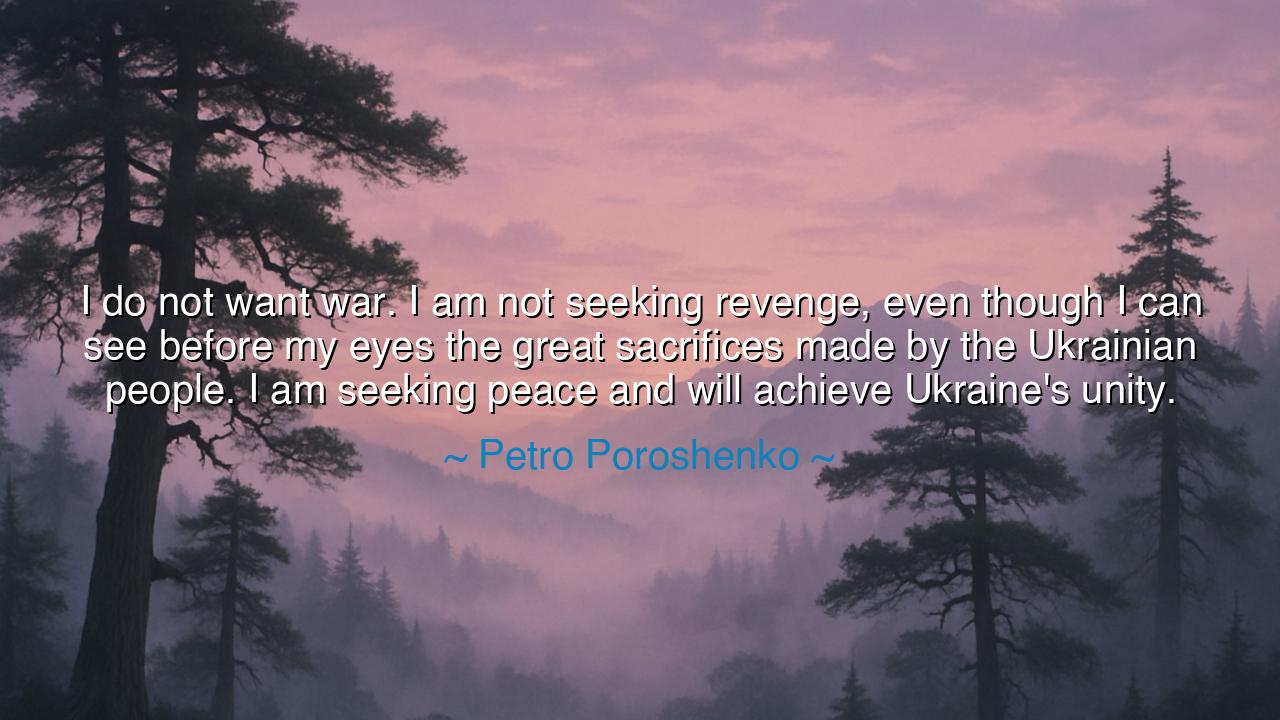
I do not want war. I am not seeking revenge, even though I can
I do not want war. I am not seeking revenge, even though I can see before my eyes the great sacrifices made by the Ukrainian people. I am seeking peace and will achieve Ukraine's unity.






In the words of Petro Poroshenko, “I do not want war. I am not seeking revenge, even though I can see before my eyes the great sacrifices made by the Ukrainian people. I am seeking peace and will achieve Ukraine’s unity.” In these solemn words beats the heart of a statesman who has walked through the valley of sorrow yet still speaks of peace. This is the voice not of weakness, but of wisdom — the wisdom that comes from witnessing the ruin of battle and still believing that light may triumph through mercy, not vengeance. To seek peace when war cries rage around you is the highest act of courage, for it is easier to raise a sword than to still the storm within the heart.
Poroshenko, who served as President of Ukraine in one of his nation’s darkest hours, uttered these words at a time when the land itself trembled — divided, wounded, besieged by conflict. Yet even as he looked upon sacrifice, upon the faces of the displaced and the fallen, he refused to bow to hatred. His words remind us of an eternal truth: that revenge is a fire that consumes both enemy and friend alike. The great souls of history have always understood that while war may forge nations, it is peace that preserves them.
From the dawn of history, this lesson has echoed through the deeds of the wise. When Abraham Lincoln, during the American Civil War, was told he should destroy his enemies, he replied, “Do I not destroy my enemies when I make them my friends?” So too, Poroshenko’s words call us to this higher vision — to see beyond the wounds of the present toward the unity of the future. The Ukrainian people, who have suffered much, are not asked to forget their pain, but to transform it — to build upon sacrifice not a tower of vengeance, but a foundation of reconciliation.
To seek peace is not to deny the reality of struggle; it is to choose what end the struggle shall serve. The warrior and the peacemaker are not opposites but different stages of the same soul’s journey. The warrior defends the land; the peacemaker heals it. The great King Ashoka of India, after conquering through blood, looked upon the field of the dead and felt his heart break. From that grief, he turned from war to wisdom, spreading compassion in place of conquest. Poroshenko’s words belong to that same ancient lineage — the understanding that the truest victory is not domination, but unity.
Yet such unity cannot be forced by sword or decree. It must be born from forgiveness, and forgiveness is the hardest labor of all. It demands that we rise above anger and see even our enemies as human — as sons, fathers, and daughters of the same earth. To seek peace amid war is to hold a mirror to the divine within oneself. It is to refuse the easy path of hatred and instead take the narrow, sacred road of endurance, compassion, and hope.
The lesson here reaches beyond borders and battlefields. Every heart harbors its own war — between resentment and forgiveness, between pride and understanding. When Poroshenko speaks of refusing revenge, he speaks to all who have been wronged, urging them to choose healing over harm. For in every family, every community, every nation, unity can only be born when peace is chosen deliberately, again and again, even when the wounds still ache.
And so, children of the future, remember this teaching: peace is not the absence of conflict, but the mastery of it. It is the art of turning pain into purpose, of transforming division into solidarity. When faced with betrayal, choose integrity. When surrounded by bitterness, answer with calm resolve. To build unity, one must first be unified within oneself. Only then can a people — or a person — rise from the ashes and walk again beneath the light of wholeness.
Thus spoke Petro Poroshenko, not as one untouched by war, but as one who looked into its abyss and chose to speak of peace. Let his words be remembered not only as a declaration of leadership, but as a call to all humankind: that though the world may break, the heart can still choose to mend. For only through peace — born of sacrifice, guided by forgiveness, and crowned with courage — can any nation, or soul, achieve its true unity.






AAdministratorAdministrator
Welcome, honored guests. Please leave a comment, we will respond soon